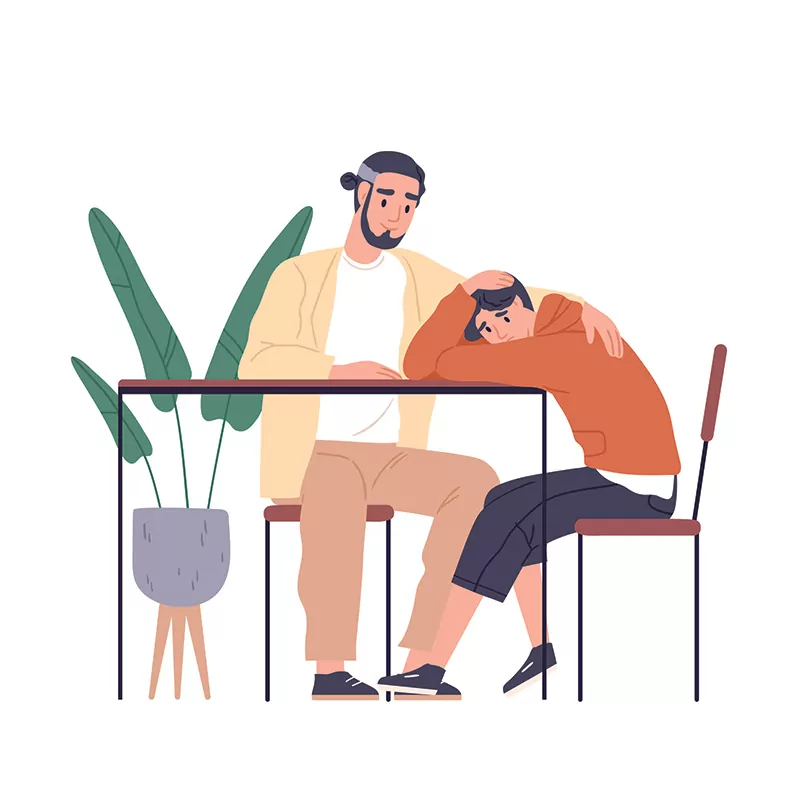Many people with a drug or alcohol addiction struggle with feelings of shame, guilt, and frustration. These types of emotions can make it seem impossible to talk to family and loved ones about substance use. Admitting that you need help can feel like a terrifying and overwhelming experience. What if they are disappointed and let down? Will your loved ones be angry?
Whatever your fears and doubts may be, reaching out for help is always a better option than bottling up your problems and causing yourself more pain. Hiding your addiction will only make you feel more isolated and alone. Being honest with your family and reaching out for support is an act of courage. It’s a major accomplishment that can put your recovery on the right track.
Imagining what to say to your family is one thing and having the actual conversation is another. It’s easy to feel anxious and confused in the moment so preparing ahead of time can make it easier and less overwhelming. Writing down the main points of what you want to say is a helpful way to keep the conversation on-topic and productive. You may also find it useful to practice the conversation with a trusted friend before having one with your family.
If you’re unsure of how to bring up the topic, here are some opening lines to use:
I need your help with a problem I have. Do you have a few minutes to talk?
Do you have time to talk with me? I want to tell you about something that’s been bothering me and making my life difficult.
I need to have a serious conversation with you about something I’m struggling with. This is hard for me to talk about so I hope you will be supportive.
The hardest part of the conversation is predicting how your family will react. They may be shocked to hear that you’re struggling with addiction or may have already suspected it. It’s possible that they will feel sad, embarrassed, or angry. Some family members may take the conversation better than others and immediately offer their support and help. Family members may also want to express how your drug or alcohol usage has impacted their lives.
Whether their reaction is positive or negative, be prepared to work through any strong feelings that arise. It may take them a few days or weeks to process the information and their emotions.
If you’re nervous about your family members having negative reactions, ask a close, supportive friend to be on standby during the conversation. Having them nearby or in the same room can help you feel more at ease if you’re finding it hard to open up. In the event that your family doesn’t react positively, a friend could also bring you to a place where you feel comfortable.
Everyone dreads having a difficult conversation because it seems like there is never a good time to talk. Putting it off though only lets your addiction continue and potentially get worse. Choose a quiet location to approach your loved ones where you feel safe. Have the conversation at a time when you feel calm and able to stay in control and handle their reactions.
Be honest with your family about how addiction makes you feel and how it affects each aspect of your life, from work to relationships to your health. Tell them about how addiction changes your body physically and mentally, which makes it difficult to stop using drugs or alcohol. Explain to them that withdrawal symptoms and the risk of relapse make it almost impossible to quit cold turkey. Ask them to respect your privacy and not share this news with other people without your permission.
To overcome the stigma of addiction, it’s important to remind your family that addiction is a chronic illness and not a choice. Let your family know that you want to change your life and that you’re not asking them to support your addiction–you’re asking them to support your recovery. Share with them that their encouragement and love will help you get your life to a better place. Ask them to help you find professional help to begin treatment for addiction.
While it seems overwhelming to talk to your family about addiction, being honest can provide a great deal of relief. Getting this secret off your chest can give you a sense of freedom to fully commit to your treatment program and make changes to your life. Recovery is a long process but you don’t have to go it alone. Opening up to those closest to you is a great first step towards building a supportive network. During tough times, turning to people for comfort and advice can make a big difference.
If you are seeking help with your loved one’s addiction, contact us today or complete our quick contact form below, to speak with an addiction treatment specialist.
If you need help with your substance use disorder, we are here to help you build your confidence and momentum towards the future you want. We provide treatment programs for adults with alcohol, opioid, and other substance use disorders.
What types of therapy and support are available for families affected by addiction?
Family therapy, group counseling, and support groups are vital components of addiction treatment. Professional counselors help families understand addiction, improve communication, and heal relationships damaged by substance use. Many treatment centers offer both individual and family therapy sessions to address the needs of everyone affected by addiction.
What support groups are available for family members?
Several support groups are available to help families cope with addiction.
These groups offer both in-person and online meetings, making support accessible when you need it most.
What are the levels of care in addiction treatment?
Addiction treatment follows a continuum of care, with services that match your specific needs and recovery progress. Medical detox is often the first step, providing 24/7 supervision and support while managing withdrawal symptoms. From there, residential treatment offers intensive, structured care where you live at the facility and receive daily therapy and support. Partial hospitalization programs (PHP) provide similar intensive treatment while allowing you to return home each evening. As you progress, intensive outpatient programs (IOP) offer flexible treatment several times per week, and standard outpatient treatment provides ongoing support through regular therapy sessions. Throughout the different stages of recovery, your care team will help determine the most appropriate level of care and collaborate with mental health professionals to develop a personalized treatment plan.
What role does behavioral health treatment play in addiction recovery?
Behavioral health treatment is essential for long-term recovery success. This approach helps identify triggers, develop healthy coping mechanisms, and address co-occurring mental health conditions. Through various types of therapy, including cognitive behavioral therapy and group counseling, you’ll learn skills to maintain sobriety and improve your overall well-being.
What recovery support options are available after completing initial treatment?
Ongoing recovery support is crucial for maintaining sobriety. Options include online outpatient treatment programs, Alcoholics Anonymous meetings, and alumni groups. Many people find that combining different support systems, such as therapy sessions, support groups, and community resources, provides the strongest foundation for lasting recovery.
 How to Talk to Your Child About Addiction: A Comprehensive Guide
How to Talk to Your Child About Addiction: A Comprehensive Guide
 Protecting Your Addiction Recovery: Setting Boundaries During the Holidays
Protecting Your Addiction Recovery: Setting Boundaries During the Holidays
 5 Tips for Supporting People with Addiction During the Holidays
5 Tips for Supporting People with Addiction During the Holidays